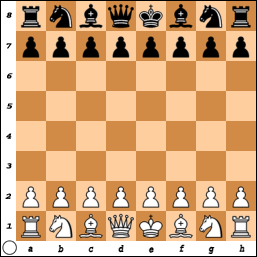
Chess Game 13: sstimson vs. c-square
-
c-square
- Shounen Tantei Dan, Dai Seikou!
Posts: 1040
Chess Game 13: sstimson vs. c-square
 - Get your Detective Conan bobbleheads today! -
- Get your Detective Conan bobbleheads today! - 
-
sstimson
- Everyone a Critic
Posts: 2588- Contact:
Re: Chess Game 13: sstimson vs. c-square
The Problem is I like to respond to other moves. I think the Black player has an advantage seeing in to the mind of their opponent. But if you insist P-K4.
So it might come down to if you want to play an open game (P-K4) or a closed game (P-Q4). I think your a P-Q4 king of player
So it might come down to if you want to play an open game (P-K4) or a closed game (P-Q4). I think your a P-Q4 king of player
Last edited by sstimson on April 24th, 2011, 8:04 pm, edited 1 time in total.
Later
Invisible Member
Invisible Member
Spoiler: SS Present from PT
-
c-square
- Shounen Tantei Dan, Dai Seikou!
Posts: 1040
Re: Chess Game 13: sstimson vs. c-square
Okay, I'll start then.sstimson wrote: The Problem is I like to respond to other moves. I think the Black player has an advantage seeing in to the mind of their opponent.
1. d2-d4 /
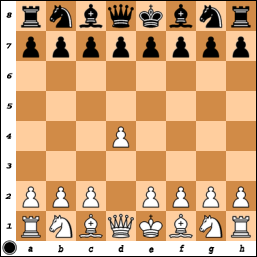
And you'd be right.sstimson wrote: I think your a P-Q4 king of player
 - Get your Detective Conan bobbleheads today! -
- Get your Detective Conan bobbleheads today! - 
-
sstimson
- Everyone a Critic
Posts: 2588- Contact:
Re: Chess Game 13: sstimson vs. c-square
I think it sad not more players are open type any more. Since we have player out there who might learn more about the game. Might I suggest that we each move write a short comment. And make this game a learning experience for all?
Mine
Pd2-d4 is a classic start for a closed kind of game. That means that player is likely more interested in position then a king side attacks that come with open game (P-K4 {e2-e4})
1. d2-d4 / e7-e6 P-K3
I dislike greatly games that go d2d4 / d7-d5. Time for a different opening.
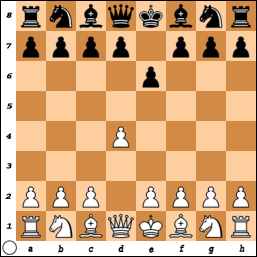
Mine
Pd2-d4 is a classic start for a closed kind of game. That means that player is likely more interested in position then a king side attacks that come with open game (P-K4 {e2-e4})
1. d2-d4 / e7-e6 P-K3
I dislike greatly games that go d2d4 / d7-d5. Time for a different opening.

Last edited by sstimson on April 25th, 2011, 12:03 am, edited 1 time in total.
Later
Invisible Member
Invisible Member
Spoiler: SS Present from PT
-
Tanner-kun
Posts: 1492
Re: Chess Game 13: sstimson vs. c-square
This will be a fun game to learn from. o3o and I might try learning some open game openings. Since I think I'm a little better with bishops then knights.
-
sstimson
- Everyone a Critic
Posts: 2588- Contact:
Re: Chess Game 13: sstimson vs. c-square
Then you are not going to like the four knight openingTanner-kun wrote: This will be a fun game to learn from. o3o and I might try learning some open game openings. Since I think I'm a little better with bishops then knights.
1 P-K4 P-K4
2 N-KB3 N-QB3
3 N-B3 N-B3
Later
Invisible Member
Invisible Member
Spoiler: SS Present from PT
-
Tanner-kun
Posts: 1492
Re: Chess Game 13: sstimson vs. c-square
ah played that one once or trice against the computer.sstimson wrote:Then you are not going to like the four knight openingTanner-kun wrote: This will be a fun game to learn from. o3o and I might try learning some open game openings. Since I think I'm a little better with bishops then knights.
1 P-K4 P-K4
2 N-KB3 N-QB3
3 N-B3 N-B3
-
c-square
- Shounen Tantei Dan, Dai Seikou!
Posts: 1040
Re: Chess Game 13: sstimson vs. c-square
Sounds like a great idea! It will be a learning experience not just for others, but for us as well!sstimson wrote: I think it sad not more players are open type any more. Since we have player out there who might learn more about the game. Might I suggest that we each move write a short comment. And make this game a learning experience for all?
1. d2-d4 / e7-e6
2. e2-e4 /
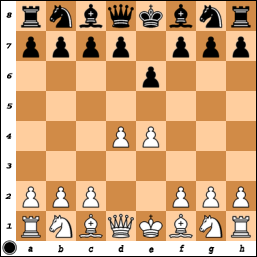
Unfortunately, I don't know as much as sstimson about openings. I played d2-d4 because it's aggressively takes control of the center of the board, and it's defended by the queen. It also prevents black from opening e7-e5.
For my second move, it was a choice between e2-e4 or e2-e3. e2-e4 is aggressive and further takes control of the center, and opens it up so that both bishops can move. However, it leaves the pawn undefended. e2-e3 is a more defensive move, and is a good one as it both supports the pawn on d4 and it defends black squares. This is important because the bishop and the queen black opened up both will be moving on black squares. Usually, I'd do e2-e3, however today I'm feeling like being risky.
 - Get your Detective Conan bobbleheads today! -
- Get your Detective Conan bobbleheads today! - 
-
sstimson
- Everyone a Critic
Posts: 2588- Contact:
Re: Chess Game 13: sstimson vs. c-square
1. d2-d4 / e7-e6
2. e2-e4 / Ng8-e7
But for now I do not wish to play such a risky game.
This is where a backwards center meets an open center.
I could attack the King pawn with N-KB3 but he might move P-K5 and chase my knight.
I could Fianchetto My bishop by either b2-b3 and Bc1-b2 or g2-g3 and Bf1-g2. The first open setts up an attack on the Queen pawn. The later does the same for the King pawn.
Fianchetto gets the Bishop on the long Diagonal and center pointed.
I thinking of setting up a pawn move by white with a possible capture by the knight while protecting the other knight. There is a good chance this game will end up in an Indian Defense.
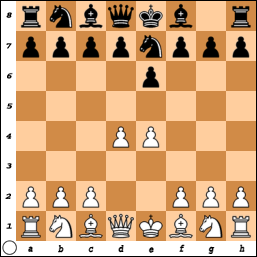
2. e2-e4 / Ng8-e7
That would be a reverse center game ( P-K4 P-Q4) and I found it. It is called A40: Queen's pawn, Charlick (Englund) gambitc-square wrote: Unfortunately, I don't know as much as sstimson about openings. I played d2-d4 because it's aggressively takes control of the center of the board, and it's defended by the queen. It also prevents black from opening e7-e5.
But for now I do not wish to play such a risky game.
This is where a backwards center meets an open center.
I could attack the King pawn with N-KB3 but he might move P-K5 and chase my knight.
I could Fianchetto My bishop by either b2-b3 and Bc1-b2 or g2-g3 and Bf1-g2. The first open setts up an attack on the Queen pawn. The later does the same for the King pawn.
Fianchetto gets the Bishop on the long Diagonal and center pointed.
I thinking of setting up a pawn move by white with a possible capture by the knight while protecting the other knight. There is a good chance this game will end up in an Indian Defense.

Later
Invisible Member
Invisible Member
Spoiler: SS Present from PT
-
c-square
- Shounen Tantei Dan, Dai Seikou!
Posts: 1040
Re: Chess Game 13: sstimson vs. c-square
1. d2-d4 / e7-e6
2. e2-e4 / Ng8-e7
3. Nb1-c3 /
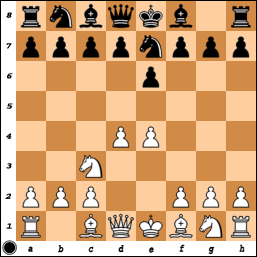
I'll get my knight out into play.
A note on knights: At the beginning of the game, all your major pieces start useless because they are blocked in by a line of pawns. Your queen, bishops and rooks can be made useful simply by moving the pawns that are blocking them. Knights, on the other hand, can only be made useful by moving them. Thus, it's important at the beginning of the game to move both of your knights out quickly. A knight left to sit in the back rank is not only useless, but it also blocks your rook from being able to move or castle. Similarly, if your opponent has blocked in their knight in its starting position, don't do anything that would allow it to come out. It's doing more for you back there than it is for your opponent.
2. e2-e4 / Ng8-e7
3. Nb1-c3 /

I'll get my knight out into play.
A note on knights: At the beginning of the game, all your major pieces start useless because they are blocked in by a line of pawns. Your queen, bishops and rooks can be made useful simply by moving the pawns that are blocking them. Knights, on the other hand, can only be made useful by moving them. Thus, it's important at the beginning of the game to move both of your knights out quickly. A knight left to sit in the back rank is not only useless, but it also blocks your rook from being able to move or castle. Similarly, if your opponent has blocked in their knight in its starting position, don't do anything that would allow it to come out. It's doing more for you back there than it is for your opponent.
 - Get your Detective Conan bobbleheads today! -
- Get your Detective Conan bobbleheads today! - 
-
sstimson
- Everyone a Critic
Posts: 2588- Contact:
Re: Chess Game 13: sstimson vs. c-square
1. d2-d4 / e7-e6
2. e2-e4 / Ng8-e7
3. Nb1-c3 / h7-h6
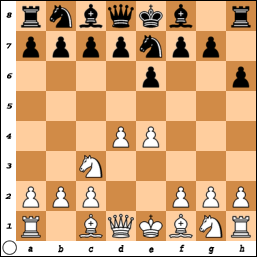
My current plan requires control of g5. It will not work if white bishop comes to that square. This should keep it away.
Also a problem I am trying to solve. I want a Knight at QB3 but doing it now walks in to the pawn fork d4-d5. The Knight at e7 will help that problem. Remember that Closed game are played for position. It is very important to try and set up a good end game position. Doing that means all future pawn moves are completely necessary for a plan, or have been checked and rechecked for a sound position. My future plans at aims at the center and at the same time weaken whites center
2. e2-e4 / Ng8-e7
3. Nb1-c3 / h7-h6

My current plan requires control of g5. It will not work if white bishop comes to that square. This should keep it away.
Also a problem I am trying to solve. I want a Knight at QB3 but doing it now walks in to the pawn fork d4-d5. The Knight at e7 will help that problem. Remember that Closed game are played for position. It is very important to try and set up a good end game position. Doing that means all future pawn moves are completely necessary for a plan, or have been checked and rechecked for a sound position. My future plans at aims at the center and at the same time weaken whites center
Last edited by sstimson on April 25th, 2011, 6:00 am, edited 1 time in total.
Later
Invisible Member
Invisible Member
Spoiler: SS Present from PT
-
c-square
- Shounen Tantei Dan, Dai Seikou!
Posts: 1040
Re: Chess Game 13: sstimson vs. c-square
Wow! You're already thinking about the endgame. You look much further ahead than I do. I have to admit, I'm a little scared!!sstimson wrote: It is very important to try and set up a good end game position. Doing that means all future pawn moves are completely necessary for a plan, or have been checked and rechecked for a sound position. My future plans at aims at the center and at the same time weaken whites center
1. d2-d4 / e7-e6
2. e2-e4 / Ng8-e7
3. Nb1-c3 / h7-h6
4. Ng1-f3 /
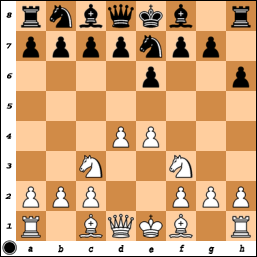
I definitely didn't expect black's last move. Any move I don't expect raises red flags in my head that I've missed something. So, first-things-first, I check to see if there is any threat to me. I can't see any, so I guess I'm free to bring out my other knight.
 - Get your Detective Conan bobbleheads today! -
- Get your Detective Conan bobbleheads today! - 
-
sstimson
- Everyone a Critic
Posts: 2588- Contact:
Re: Chess Game 13: sstimson vs. c-square
1. d2-d4 / e7-e6
2. e2-e4 / Ng8-e7
3. Nb1-c3 / h7-h6
4. Ng1-f3 / g7-g5
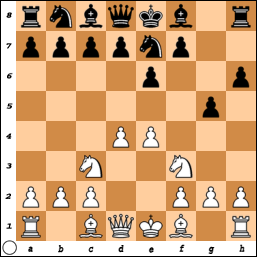
Why this move you ask. Here why. I need my Bishop at g7 so the pawn must move. I am also planning on moving the knight to g6. It I move the knight first then the Bishop gets locked in. If I move the pawn to g6 the bishop can get out but the knight can now not go to g6 unless I move the pawn again. Now with the pawn there both the bishop and knight are free. Yes White can remove both the G and H pawns but at the cost of a knight and a Bishop, so I think I am safe. I wanted to keep the White bishop from h6 because if this happens then I got his Queen at h6.
c1 to either e3 or f4, d1-d2 and Bishop to h6. If I take it then QxBh6 and I got his Queen at h6. Now that is not a problem.
By the way B-N2 and N-N3 both are helping support a future move of P-K4 an making this game an open one. If I just move P-Q4 then it becomes a closed game. If I moved this move P-KN4 last move white might have played BxP and temporary go up a pawn. Again that is no longer a problem. I might add a Kind Side Castle and R-K1, Q-K2 to further support P-K4
This move also hinders his developmental as his Queen Side Bishop now has both N5 and B4 removed as squares to go to. It is limited to either K3 or Q2. This weaken his attempted control of e5. His pawn is blocked by his knight and his Queen is blocked by his pawn. If he pushes it to K5 then P-d6 then after PxP QXP and I get my Queen developed to help fight for the d side. It might look weird, but I believe it to be a sound plan.
2. e2-e4 / Ng8-e7
3. Nb1-c3 / h7-h6
4. Ng1-f3 / g7-g5

Why this move you ask. Here why. I need my Bishop at g7 so the pawn must move. I am also planning on moving the knight to g6. It I move the knight first then the Bishop gets locked in. If I move the pawn to g6 the bishop can get out but the knight can now not go to g6 unless I move the pawn again. Now with the pawn there both the bishop and knight are free. Yes White can remove both the G and H pawns but at the cost of a knight and a Bishop, so I think I am safe. I wanted to keep the White bishop from h6 because if this happens then I got his Queen at h6.
c1 to either e3 or f4, d1-d2 and Bishop to h6. If I take it then QxBh6 and I got his Queen at h6. Now that is not a problem.
By the way B-N2 and N-N3 both are helping support a future move of P-K4 an making this game an open one. If I just move P-Q4 then it becomes a closed game. If I moved this move P-KN4 last move white might have played BxP and temporary go up a pawn. Again that is no longer a problem. I might add a Kind Side Castle and R-K1, Q-K2 to further support P-K4
This move also hinders his developmental as his Queen Side Bishop now has both N5 and B4 removed as squares to go to. It is limited to either K3 or Q2. This weaken his attempted control of e5. His pawn is blocked by his knight and his Queen is blocked by his pawn. If he pushes it to K5 then P-d6 then after PxP QXP and I get my Queen developed to help fight for the d side. It might look weird, but I believe it to be a sound plan.
Later
Invisible Member
Invisible Member
Spoiler: SS Present from PT
-
c-square
- Shounen Tantei Dan, Dai Seikou!
Posts: 1040
Re: Chess Game 13: sstimson vs. c-square
1. d2-d4 / e7-e6
2. e2-e4 / Ng8-e7
3. Nb1-c3 / h7-h6
4. Ng1-f3 / g7-g5
5. h2-h4 /
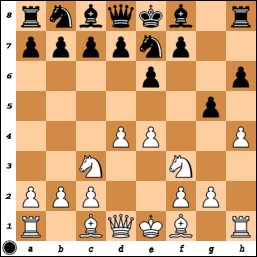
I had to think long and hard about this one. I so wanted to take your pawn with my knight, but in the end the board advantage I'd get couldn't justify the loss in pieces. So, I'll advance my pawn instead.
sstimson, how much should we reveal in our move notes? If we give everything we're doing away, it makes it easy for the opponent to counter any moves we make. Maybe, if we withhold any information after a move, we can later go after the situation has passed and edit that post to explain the strategy we were taking. What do you think?
Oh, and btw, I'm going to edit my move 4 post to add a bit more info. Actually, on second thought, I'll post it right here. It's going to take me a couple minutes, however, to get the diagrams made.
Okay, they're done! A good way to examine board position is to see what squares each side threatens. It's not perfect, as it doesn't take into account piece mobility or the ability to defend the king, but it's still useful. After four moves, here's what the board looks like:
White threatens or protects 35 squares
Black threatens or protects 26 squares
The more squares you threaten or protect, the more power you have to control the board. For me, especially when opening, if all else is equal I try to choose the move that gains me the most board control possible.
2. e2-e4 / Ng8-e7
3. Nb1-c3 / h7-h6
4. Ng1-f3 / g7-g5
5. h2-h4 /

I had to think long and hard about this one. I so wanted to take your pawn with my knight, but in the end the board advantage I'd get couldn't justify the loss in pieces. So, I'll advance my pawn instead.
sstimson, how much should we reveal in our move notes? If we give everything we're doing away, it makes it easy for the opponent to counter any moves we make. Maybe, if we withhold any information after a move, we can later go after the situation has passed and edit that post to explain the strategy we were taking. What do you think?
Oh, and btw, I'm going to edit my move 4 post to add a bit more info. Actually, on second thought, I'll post it right here. It's going to take me a couple minutes, however, to get the diagrams made.
Okay, they're done! A good way to examine board position is to see what squares each side threatens. It's not perfect, as it doesn't take into account piece mobility or the ability to defend the king, but it's still useful. After four moves, here's what the board looks like:
White threatens or protects 35 squares
Spoiler:
Spoiler:
Last edited by c-square on April 25th, 2011, 9:08 pm, edited 1 time in total.
 - Get your Detective Conan bobbleheads today! -
- Get your Detective Conan bobbleheads today! - 
-
sstimson
- Everyone a Critic
Posts: 2588- Contact:
Re: Chess Game 13: sstimson vs. c-square
1. d2-d4 / e7-e6
2. e2-e4 / Ng8-e7
3. Nb1-c3 / h7-h6
4. Ng1-f3 / g7-g5
5. h2-h4 / f7-f6
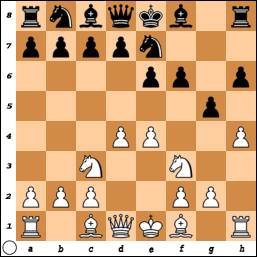
This move might have happened later In my trying to control e4 for P-K4 and the open game
Now for reason why it is bad to take the pawn
1) I get a very week doubled h pawns ( remember end game position)
2) while I do get a Knight of a edge square (less moves for the Knight) well see #1
3) That pawn is slowly becoming a headache for white and his current move limits his king Knight even further. With my pawn move and White last move the Knight's safe squares went from five (g1, h2, h4, e4, d2) to three (g1, h2, d2) further more it is currently easy to attack.
I might have continued with my plan by B-N2 then PxP PxP RxR BxR but I wait a little for exchanges
Now if PxP BPxP and no major exchanges happen
2. e2-e4 / Ng8-e7
3. Nb1-c3 / h7-h6
4. Ng1-f3 / g7-g5
5. h2-h4 / f7-f6

This move might have happened later In my trying to control e4 for P-K4 and the open game
Now for reason why it is bad to take the pawn
1) I get a very week doubled h pawns ( remember end game position)
2) while I do get a Knight of a edge square (less moves for the Knight) well see #1
3) That pawn is slowly becoming a headache for white and his current move limits his king Knight even further. With my pawn move and White last move the Knight's safe squares went from five (g1, h2, h4, e4, d2) to three (g1, h2, d2) further more it is currently easy to attack.
I might have continued with my plan by B-N2 then PxP PxP RxR BxR but I wait a little for exchanges
Now if PxP BPxP and no major exchanges happen
Later
Invisible Member
Invisible Member
Spoiler: SS Present from PT



